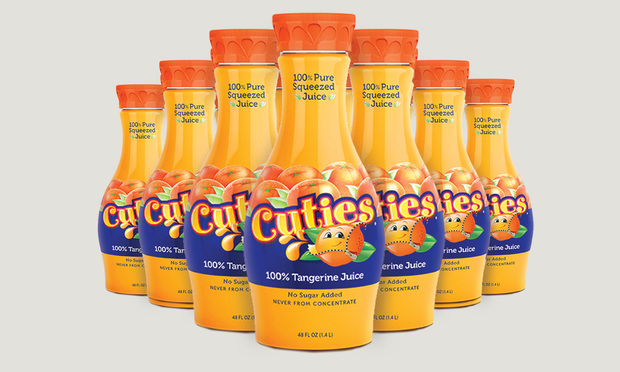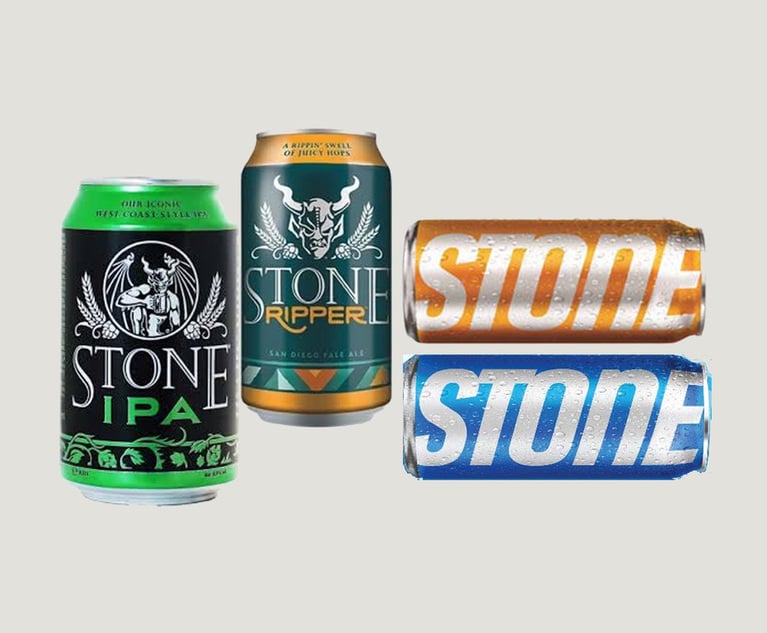Too Cute? Appeals Court Nixes Claim Over 'No Sugar Added' Label on Cuties Juice
The Second District Court of Appeal upheld a ruling dismissing a class action against a tangerine juice-maker accused of fraudulently branding its product as "No Sugar Added"—not because the juice contained sugar but because it implied that competitors' products might.
February 06, 2020 at 09:05 PM
3 minute read
 Cuties (Courtesy photo)
Cuties (Courtesy photo)
A California appellate court found that a reasonable person would not jump to the same conclusions as a plaintiff who alleged a tangerine juice-maker fraudulently branded its product as "No Sugar Added," implying that all other competing juices do contain added sugar and are less healthy.
California's Second District Court of Appeal Thursday affirmed the dismissal of the case against plant-based food producer Califia Farms, defended by Sheppard Mullin Richter & Hampton's Sascha Henry in Los Angeles.
Plaintiff Michelle Shaeffer, who said she bought the juice because her children enjoy tangerines and because she's diabetic, asserted that the company's Cuties Juice label is "likely to deceive reasonable consumers in its implications" in violation of California's Unfair Competition Law, Consumer Legal Remedies Act and the state's false advertising law.
Second District Associate Justice Brian Hoffstadt wrote that, "because a reasonable consumer is not likely to engage in these inferential leaps, we conclude that the 'No Sugar Added' label on Cuties Juice is not actionable as a matter of law."
Administrative Presiding Justice Elwood Lui and Associate Justice Victoria Chavez concurred with the decision.
Schaeffer, represented by Capstone Law's Ryan Wu and Robert Friedl in Los Angeles, brought the suit on behalf of a proposed class of consumers who also considered the "No Sugar Added" qualifier deceptive. Her lawyers argued that the Superior Court of Los Angeles County wrongfully sustained Califia's demurrer in the case and improperly denied her leave to amend.
In affirming the demurrer, the appellate court decided that truthful statements about a product that do not mention competing products cannot be actionable as a matter of law.
"An example vividly makes our point: Assume that a new airline runs an ad with a tagline, 'No Hijackers Allowed.' Is a reasonable consumer likely to infer that other airlines do allow hijackers and that the new airline is consequently the safer choice? We think the answer to this question is 'no.'"
The Second District also ruled that the state court did not abuse its discretion in denying Schaeffer's leave to amend.
"Plaintiff proffered no specific amendments to the trial court. She proffers none to this court beyond her blithe remark that 'there could well be ways that any defect in the present pleading could be corrected,' Hoffstadt wrote. "This is plainly insufficient to carry her burden'."
The case is one of several misleading labeling suits to hit California appellate dockets this year. On Dec. 23., the U.S. Court of Appeals for the Ninth Circuit dismissed the appeal of a lawsuit claiming Diet Coke falsely implied that drinking it would help consumers slim down, and a week later ruled that Diet Dr Pepper was similarly not at fault for consumers' health misconceptions of the product.
This content has been archived. It is available through our partners, LexisNexis® and Bloomberg Law.
To view this content, please continue to their sites.
Not a Lexis Subscriber?
Subscribe Now
Not a Bloomberg Law Subscriber?
Subscribe Now
NOT FOR REPRINT
© 2025 ALM Global, LLC, All Rights Reserved. Request academic re-use from www.copyright.com. All other uses, submit a request to [email protected]. For more information visit Asset & Logo Licensing.
You Might Like
View All
Willkie Farr & Gallagher Drives Legal Challenge for Uber Against State's Rideshare Laws
5 minute read
'Ice Pop,' 'Meta Moon,' 'Blue Raspberry': Tracked Drink Flavor Searches Fail in Privacy Suit
4 minute read
How We Won: BraunHagey’s $56M Trademark Win Over Molson Coors Upheld by 9th Circuit
8 minute readLaw Firms Mentioned
Trending Stories
- 1South Florida Attorney Charged With Aggravated Battery After Incident in Prime Rib Line
- 2'A Death Sentence for TikTok'?: Litigators and Experts Weigh Impact of Potential Ban on Creators and Data Privacy
- 3Bribery Case Against Former Lt. Gov. Brian Benjamin Is Dropped
- 4‘Extremely Disturbing’: AI Firms Face Class Action by ‘Taskers’ Exposed to Traumatic Content
- 5State Appeals Court Revives BraunHagey Lawsuit Alleging $4.2M Unlawful Wire to China
Who Got The Work
J. Brugh Lower of Gibbons has entered an appearance for industrial equipment supplier Devco Corporation in a pending trademark infringement lawsuit. The suit, accusing the defendant of selling knock-off Graco products, was filed Dec. 18 in New Jersey District Court by Rivkin Radler on behalf of Graco Inc. and Graco Minnesota. The case, assigned to U.S. District Judge Zahid N. Quraishi, is 3:24-cv-11294, Graco Inc. et al v. Devco Corporation.
Who Got The Work
Rebecca Maller-Stein and Kent A. Yalowitz of Arnold & Porter Kaye Scholer have entered their appearances for Hanaco Venture Capital and its executives, Lior Prosor and David Frankel, in a pending securities lawsuit. The action, filed on Dec. 24 in New York Southern District Court by Zell, Aron & Co. on behalf of Goldeneye Advisors, accuses the defendants of negligently and fraudulently managing the plaintiff's $1 million investment. The case, assigned to U.S. District Judge Vernon S. Broderick, is 1:24-cv-09918, Goldeneye Advisors, LLC v. Hanaco Venture Capital, Ltd. et al.
Who Got The Work
Attorneys from A&O Shearman has stepped in as defense counsel for Toronto-Dominion Bank and other defendants in a pending securities class action. The suit, filed Dec. 11 in New York Southern District Court by Bleichmar Fonti & Auld, accuses the defendants of concealing the bank's 'pervasive' deficiencies in regards to its compliance with the Bank Secrecy Act and the quality of its anti-money laundering controls. The case, assigned to U.S. District Judge Arun Subramanian, is 1:24-cv-09445, Gonzalez v. The Toronto-Dominion Bank et al.
Who Got The Work
Crown Castle International, a Pennsylvania company providing shared communications infrastructure, has turned to Luke D. Wolf of Gordon Rees Scully Mansukhani to fend off a pending breach-of-contract lawsuit. The court action, filed Nov. 25 in Michigan Eastern District Court by Hooper Hathaway PC on behalf of The Town Residences LLC, accuses Crown Castle of failing to transfer approximately $30,000 in utility payments from T-Mobile in breach of a roof-top lease and assignment agreement. The case, assigned to U.S. District Judge Susan K. Declercq, is 2:24-cv-13131, The Town Residences LLC v. T-Mobile US, Inc. et al.
Who Got The Work
Wilfred P. Coronato and Daniel M. Schwartz of McCarter & English have stepped in as defense counsel to Electrolux Home Products Inc. in a pending product liability lawsuit. The court action, filed Nov. 26 in New York Eastern District Court by Poulos Lopiccolo PC and Nagel Rice LLP on behalf of David Stern, alleges that the defendant's refrigerators’ drawers and shelving repeatedly break and fall apart within months after purchase. The case, assigned to U.S. District Judge Joan M. Azrack, is 2:24-cv-08204, Stern v. Electrolux Home Products, Inc.
Featured Firms
Law Offices of Gary Martin Hays & Associates, P.C.
(470) 294-1674
Law Offices of Mark E. Salomone
(857) 444-6468
Smith & Hassler
(713) 739-1250







